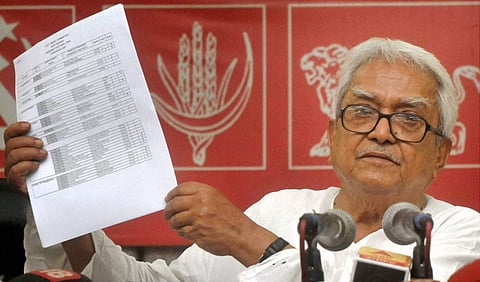Handing the ‘sickle and hammer’ to Congress
With the Left parties set to join hands for an electoral alliance ahead of the assembly polls, politics of opportunism has taken centre stage

The unthinkable is being shaped in West Bengal, ahead of the assembly elections, as age-old party ideology is being surmounted to form a coalition of the Congress and the Left parties, namely the Communist Party of India-Marxist (CPM), to defeat the ruling Trinamool Congress (TMC).
The principles of Communism and its orientations of a socialist society were long abolished by India’s neo-Leftists when they participated and ran governments in democratic formats, circumventing the proverbial “little red book”. And now, the “understanding” that is being forged in Bengal will put electoral opportunism as the predominant precursor to the prisms of principles that we have been seeing for ages.
The Congress party over the years has certainly convoluted its ideology, especially since India’s polity started fragmenting, giving rise to regional satraps such as Mamata Banerjee, J. Jayalalitha, Sharad Pawar and many others, who won elections mostly based on individual charisma, where the parties became subservient to their personal beliefs and ideas.
The idea of an ideology was long lost for the party that ruled India for no less than 49 years, though not at a stretch. Is the Congress a socialist, ‘moderate’, left-of-centre or centrist party? This could be the most difficult question for its top leadership as political opportunism took centre stage long before.
Its critics would argue that it is centrist, enough for former prime minister Manmohan Singh to actually put his tenure at stake for a nuclear deal with the United States. Or is it socialist enough to actively pursue neo-liberal economic policies?
For some time now, Congress seems to be struggling for its own exclusive space in India’s political arena and now the Left parties have joined the space by putting their “sickle and hammer” in Congress’s “hand”. However, their coyness to openly declare their covert intention to cohabit the same space was in display when Left Front chairman Biman Bose declared the names of candidates indirectly trying to accommodate the Congress party along with Rashtriya Janata Dal (RJD) and Janata Dal — United (JDU) in a rainbow coalition.
During the Bihar elections, CPM was outside the grand alliance because of a fastidious disinclination to join hands with RJD as it was tainted by corruption and JDU, because it had polluted itself by aligning with the Bharatiya Janata Party (BJP) earlier. Both the parties have a long history of antipathy towards each other, despite the fact that CPM has willingly entered a political understanding, sacrificed seats and cajoled smaller parties in the Front, trying to ensure its political survival in the state, which it had ruled for 34 years.
The irony of this alliance also affects another state, Kerala, where Congress and CPM are locked in a bitter battle while they fight TMC shoulder-to-shoulder in West Bengal. The awkwardness is obvious as the top leadership of both the parties have not said a word endorsing the arrangement.
The leadership though has avoided the embarrassment of a joint campaign, trying to somehow protect individual identity, thereby also sacrificing the advantage of showcasing a united front, which will again be questioned by voters. The awkwardness will arise when the parties will have to jointly address the press to announce the seat-sharing arrangement, urging the masses to transfer their vote to the other party and trying to defeat a common enemy — TMC.
TMC chief and West Bengal Chief Minister Mamata Banerjee for once is right in terming this understanding between Congress and CPM as “unethical”. It certainly cannot be ideological and it cannot be on a common agreement on policies, especially economic policies.
Politics is often described as the art of the impossible and that is exactly what is on display here, where opportunism takes centre stage and political survival is key in seeking alliances. Many argue that the two parties have united as they have found common ground in the religious intolerance coupled with authoritarian-style functioning that the state and the country finds itself in.
The counter narrative that is being provided by psephologists is that the polarisation of political parties has started in India especially with the rise of the BJP and its spectacular performance in the general elections in 2014. Over the years, more such alliances will be formed and two parties will be at the forefront, forming the much-desired two-party system that will eventually unite the fragmented polity of India.
Others have suggested that this “alliance” is basically a turning point in India’s political landscape as the “good forces” are aligning to fight the evil and for that they are consciously demolishing the principles that many thought were an epitaph of their identities. However, principles are what make an organisation, be it in the political or business space. Without it, all that is left is the hollowness of opportunism.
Archisman Dinda is a journalist based in Kolkata, India.



